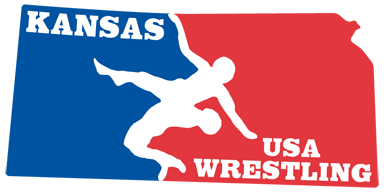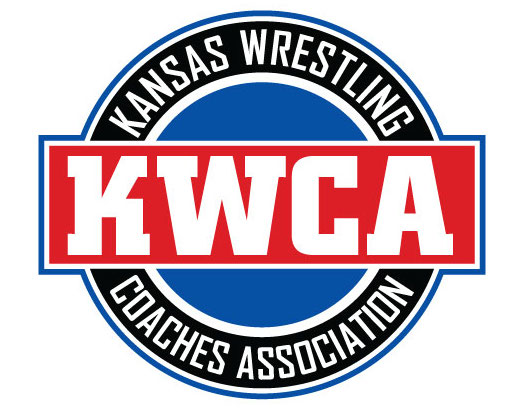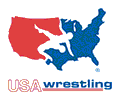This is a pretty good story also.
From the archives of the UNO Alum magazine,
published by the UNO Alumni Association from 1990 to 2009.
From the
Summer 2004
UNO Alum
magazine.
_________
Access past
UNO Alum
magazines at
www.unoalumni.org/unoalum _________
Access past
Gateway files
at the
Gateway Archive.
Duking and his
Band of Brothers
by Warren Francke
Photo by Eric Francis
Duke stands 6-foot-5 and walks tall in the world of collegiate wrestling. He’s won titles, “Coach of the Year,” a place in a Hall of Fame. Some 60 of his wrestlers now coach the sport, from UNL to the University of San Francisco and back to the Skutt High teams that win year after year.
But all that seems secondary when you talk to Mike Denney or when you hear what others say about the man who led his “Band of Brothers” to the 2004 Division II national championship. Sports psychologist Jack Stark, who worked with Tom Osborne’s Cornhuskers and now counsels NASCAR drivers, keeps it simple: “Mike’s the best coach in the state in any sport.” Why? Primarily, “Great character.”
Don Leahy, the athletic director who hired Denney 25 years ago, agrees: “Great personal character.” It doesn’t grow on trees, but has roots north of Neligh, Nebraska.
They called his Dad “Duke,” too, but John Wayne was Mike’s hero. And his mother, Grace Denney, is the angel in his life. Ask Mike or Grace about his father and you hear the same words: “He was an alcoholic. We never saw him much.”
Grace was always there. And she’s still on that Antelope County farm at age 88. Strong winds blew down the barn a few years ago, but Grace has survived 70 years on the same piece of land, and “I love it here.” Mike once took two wrestlers down that sandy road to visit his mom, and they wondered that he’d let her live alone in rural isolation. Then they drove in the yard and saw her shoulder a rifle to shoot rabbits.
Mike and his younger brother Dave rode a bicycle to a one-room school a mile and a half away. “Grandpa made us a bike with an extra seat on the back,” Mike said. “Mom made our shirts,” but store-bought their overalls.
“She modeled the way for us,” he explained. On Sundays, she brought them to that same one-room schoolhouse. “We didn’t call it church. There was a piano that someone played with one hand.” Grace sent away to the American Sunday School Union for lessons, and taught the boys and neighbors.
When her sons went north to Dakota Wesleyan, where Mike won a football scholarship, she’d wash dishes in town for 50 cents an hour. “She’d send Dave and me envelopes every week with $10 in them.”
Angels and Character
You start to see why Duke believes in angels, and where roots sink deep and character thrives.
A few weeks ago, Grace wiped away tears, her hands poised prayerfully before her face. She cried with gratitude for “all those nice things they said” about her son at the presentation of the championship trophy. She’s grateful that the boys got loans to go to college in Mitchell, S.D., and that they paid them back.
And she’s even happier that Mike found his wife, Bonnie, there. “He couldn’t have met anyone nicer.” They almost lost Bonnie to multiple sclerosis in 1990. “We said our goodbyes,” Mike recalled, but she fought back and continues to stay fit. So Coach Denney, the son and the husband, had two models for “faith in action,” two women who walked the walk.
Bonnie grew up near the Corn Palace, that Mitchell landmark, “the world’s biggest bird feeder.” She captained the cheerleaders—“Go Tigers!”—and Mike was captain of the football team, so they knew each other long before he asked her to dance. What was he waiting for? “She was way above me. The Homecoming Queen. She was Division I and I was NAIA.” When he finally got up the courage (“He was actually kind of a quiet guy,” Bonnie observed), the entire team was watching. “It was kind of awkward,” Bonnie admits. Mike sticks to the sports metaphors and calls her, “My best recruiting job.”
They married after graduation and headed to Omaha, where he assisted in coaching at South High while she taught at Bryan. But teaching wasn’t the main reason they took jobs in the big city. Mike came to play lineman for the Omaha Mustangs, coached by the legend who Mike still calls “Mr. Leahy.”
He played seven years as a semi-pro, always “an absolute gentleman and a ferocious competitor,” Leahy says. He tried to make the NFL, coming close in tryouts with the Chicago Bears but falling short. Was that disappointing? “Hugely,” Mike nods. “Not to me,” Bonnie notes.
She always knew he’d make a fine coach, just as mother Grace “always assumed he’d go into sports,” even if “the first grade teacher could never get him to talk.” That might surprise his wrestlers and amaze their three children. Daughter Mikki, now soccer coach at the University of Minnesota, knew if she did something wrong, her early-rising father would find time for a rather lengthy lecture accompanied by illustrative stories. Mikki Denney Wright and her brothers, Rocky and Luke, learned about coaching the hard way.
“Growing up,” Mikki recalled, “part of me said I’d never be a coach because it takes so much time. He was so consumed by it.” Later, she came to see it as “the highest calling.”
If “calling” is a term you confine to religious vocations, you haven’t spent much time with her father. The University of Wyoming offered him higher pay to head its Division I program. More than once. But he stayed where, he believed, “God wanted me. I felt called to do it.”
'A Young Man's Game'
Mike, who came to UNO from coaching at Bryan High in 1979, weighed a career shift a decade ago when shocked by the sudden release of basketball coach Bob Hansen. Taking six hours of educational administration, he told a reporter, “It’s a young man’s game. At 46, I’m one of the oldest ones coaching.”
Now he’s 57, his team champions again, once more “Coach of the Year,” even though confined to five scholarships. And, his elder son marvels, he did it in his 25th year by “grasping something new.” Rocky, who has given his parents three grandchildren, sees his father from the perspective of his own work in sales, technology and his current job in logistics with a salt firm.
“He gets up so early (4:30 a.m.),” Rocky notes, “and uses that time to mull over everything. He’s intensely introspective.”
What part of Mikki’s coaching came from her dad? “Probably everything.” Bonnie made her an outfit at age 5 and she became a mascot cheerleader for the wrestlers. “Dad taught me how to fight when I was in third grade.”
The Denney kids grew up with wrestlers as part of the family. “We’d pray for them,” Mikki said. “Mark Manning (now UNL coach) and others babysat us.”
In the Denney home, prayers are placed in a basket: slips of paper with names, hopes, needs. It started more simply but the prayers are now color coordinated. And there’s more than the wicker basket. “We have a big sack of answered prayers,” Mike explained. Yes, a large plastic bag bulges with answered prayers.
No, they’re not about pinning opponents to the mat. They’re part of Coach Denney’s lifetime commitment to his young men. Recent prayers have involved an alum “whose wife is really struggling with a degenerative disease” and another with a marriage in trouble.
Mike preaches “iron discipline” to his wrestlers. In the spring, the season over, they set goals for fitness and goals for academics. Most cynics will have stopped reading by now, but it’s worth noting that the new champs also carried the highest grade point average of his 25 teams: 3.359, third of any team in the nation.
You’ve heard about those academic All-Americans produced by the football Cornhuskers? Denney’s “Band of Brothers” featured 10 academic All-Americans just this season. Ho-hum, if you’re so inclined, his 136 wrestling All-Americans (top eight finishers) and his 18 national champions, but bow deeply to his scholars.
Asked if he takes special pride in producing 60 coaches, he’s not that restrictive. “I’m proud of all those guys.” Not just the coaches, but the doctors and firefighters, the ones in law enforcement, the businessmen, the engineers and military. All of them. “If the iron discipline doesn’t transfer into their private lives, you can’t say you’ve succeeded. If we just win matches, what good are we doing?”
But 60 coaches? That says something about the experience of wrestling for the Duke. Look back at clippings from when it began, when Leahy hired the Bryan High coach to lead the UNO Mavericks. A news story in 1979 noted that the new man, age 32, had experience at all but heavyweight. Buried at the end in small type, it said gridder “Mark Rigatuso could help out.” That understatement was followed by the under-sized Rigatuso, 215 pounds in a world of monsters, winning two national titles.
Along came Ryan Kaufman and then Mark Manning, two more champs. By 1981, Denney was named Division II Coach of the Year after finishing third in the nation. He was still competing in judo, and a story about winning second place in the U.S. put it “way down his list of priorities”—well after “husband, father and good wrestling coach.”
That didn’t stop him from taking the national judo championship at 209 pounds a few years later. Early morning workouts keep him fit, holding between 230 and 235—part of the iron discipline, modeling the way, walking the walk. Discipline in prayer, in training, in everything.
He’d win his first national championship and another coach of the year award in 1991. The records accumulate: high national rankings, academic All-Americans and the other kind. And he stays fit, or he might lose his black belt with “Duke” on it.
Mike dons the gi, his white judo outfit, and any wrestler who throws him can win the belt. Keep in mind that his wrestlers include Les Sigman (Mikki calls him “the silent assassin”), national heavyweight champ the past two seasons. The coach, Les says, “is like a father to me. He gives me confidence; he’s calm and he’s always there.”
So can you whip the old man? Sigman, a 240-pound mound of power, lets a small smile flicker and says, “He’s still got it.”
Mike’s smile is much broader when he talks about the “Duke” belt. He hasn’t surrendered it, claiming “They’re getting to the point where they’re nice to me.”
The Family Thing
Sigman attends St. Paul’s Methodist Church with the Denneys. “The family thing” goes back to Neligh and Mike’s high school coach, Roger Barry. “It was like he had 30 sons” who hung together, “street-fought together.” Denney soaked up savvy from everyone—his mother’s work ethic and her faith, his wife’s faith and courage, the discipline of Beauford Haizlip, the coach he assisted at South. He visits other programs each year—from the great Dan Gable at Iowa, he learned about training and conditioning.
R.J. Nebe, an alum who assists Brad Hildebrandt at Skutt, sums up his mentor: “He’s not a great technical coach. He’s a great manager. It’s his loyalty and character. You can go to any coach in the country and you’ll not hear a single one say anything bad about him.”
Loyalty? That first job offer from Wyoming set him thinking. “I’d never asked for a raise.” He thought he’d go to the athletic director and tell him “I wanted two of three things: raise my budget, raise scholarships or raise my salary.” He rehearsed his pitch and went to see Bobby Thompson, a Southern-fried, cigar-smoking sweet-talker who called the ladies “dahling.” But Bobby was “a tough son-of-a-gun to deal with.”
He had “that big cigar going” as Mike recited his ultimatum. “He blew smoke my way and said, ‘You go to Wyoming, and I’ll drop your program.’ I walked right out.”
So, of course, he stayed at UNO. He stayed through that awful year when MS nearly got Bonnie, when that wonderful wrestler, that upright fellow named Ryan Kaufman died in a car crash. He stayed to see his three children grow into good athletes, especially in soccer, and good people.
You can see some of his success when you walk into the large room in the fieldhouse, the floor covered in mats, the walls resplendent with banners that tell the wrestling story. You may hear, “Welcome to the dojo,” followed by the guttural greeting, “ooosss,” a battle cry that means, “Bring it on.” It’s comforting to know it’s a sign of mutual respect.
And you’ll see more in his office, beneath the long horns of a steer, a gift from auto dealer Roy Smith. It’s not a plush place. Water spots stain the ceiling, duct tape mends the black couch. But it’s bright with family photos. The grandkids beam at “Grampa Duke,” and the clock above the door comes from brother Dave, “the horse whisperer.” Some martial arts items, a sword, add an Asian touch. Then there are passages from scripture, from Isaiah and from Psalm 27:1. “Except the Lord build the house, they labor in vain who build it.”
Bonnie said, “That’s a big part of what he’s all about.”
The Duke’s there, too: A sketch of John Wayne in cowboy hat, and a photo of Rooster Cogburn, glaring out of that one good eye, a black patch on the other.
More often than not, a well-muscled young man or two stops by. Craig Sesker, the Omaha World-Herald writer who covers wrestling, calls Denney the best coach he’s covered in 15 years.
What impresses him most is how Denney finds time for 30 wrestlers, including four pairs of birth brothers. He has a word or two or more, a pat on the head for each and every one. It would take a story twice this long to cover every ritual, every motto, every rule and value that governs the Denney way. The virtues he preaches don’t become platitudes because he lives them. “I wasn’t the guy most likely to succeed in college,” he claims. “I’m an ordinary guy with an extraordinary God.”
Mike and Bonnie are emptynesters now, in the usual sense. She goes on the road, recruiting with him to refill the nest, in the unusual sense of their larger family. They won’t add many this year; all the starters return from the “Band of Brothers.”
“When I pass,” Coach Denney reflects, “I want to be remembered as a ‘Master Encourager.’” Grace gave him life and grace goes with him. Amazing. In a phrase he directs at others, “It’s a pleasure and an honor.”







